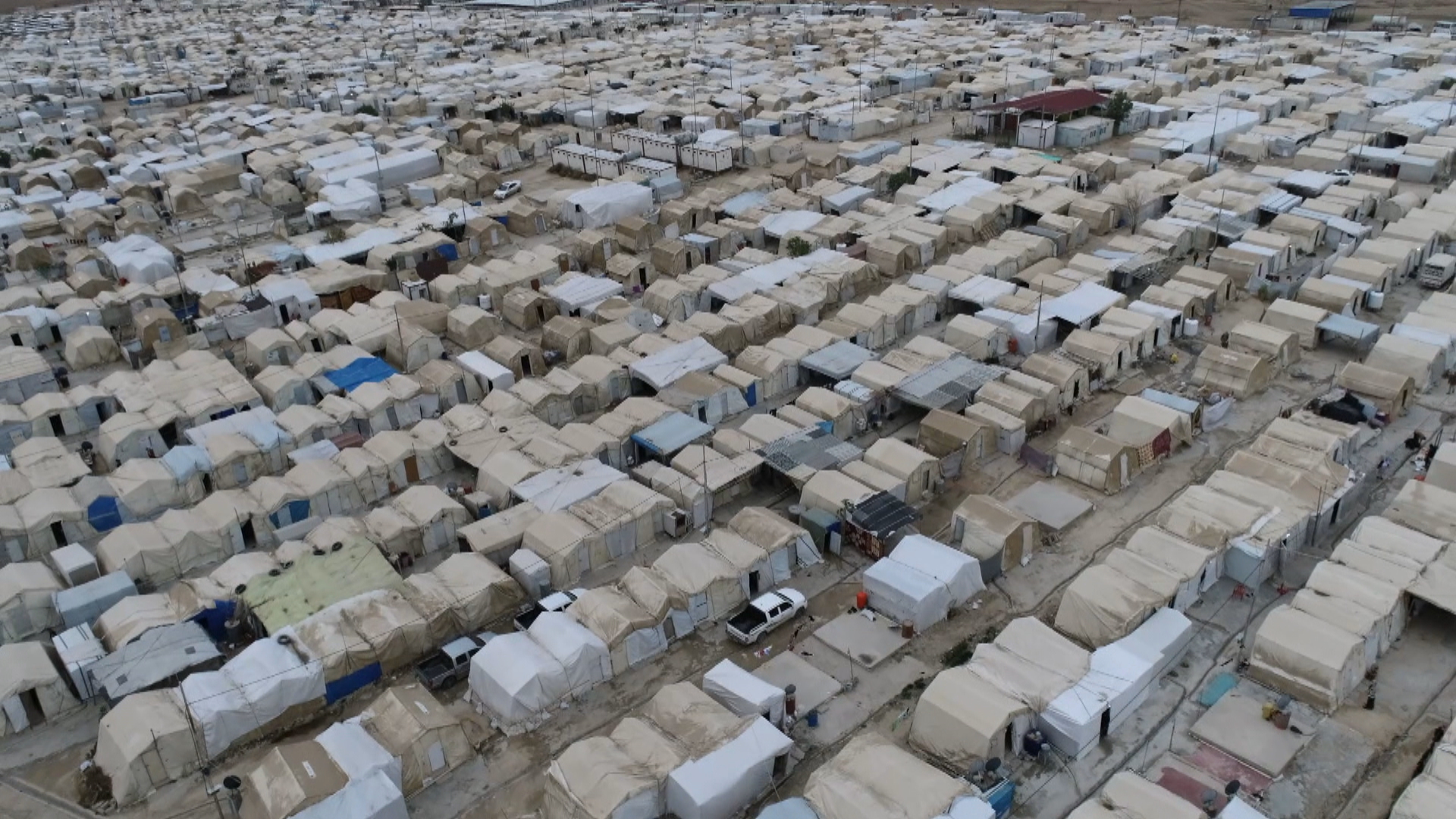DUHOK, Kurdistan Region - Despite rival forces controlling Shingal declaring the region "safe", Yazidis who fled the two-day intense conflict to seek shelter across a dozen IDP camps in the Kurdistan Region's Duhok province have told Rudaw they are unwilling to return, fearing for their safety and citing a lack of security.
At least 701 Yazidi families numbering 4,083 people were displaced from the towns of Sinune and Dugere in their homeland of Shingal, in the wake of two days of intense fighting between the Iraqi army and a militia group affiliated with the Kurdistan Workers' Party (PKK), the Kurdistan Regional Government’s (KRG) Joint Crisis Coordination (JCC) said on Tuesday.
"There were untold numbers of fires flying over our house," Naro Ibrahim, a displaced Yazidi woman who fled her home in Shingal on Tuesday fearing the renewed clashes, told Rudaw that day. "Mortars and PKC bullets landed in our house. So, we decided to leave and will not return at all."
Having sought shelter in Duhok's Sharya camp, the mother stressed the ongoing instability in the Yazidi heartland which was ravaged by the Islamic State (ISIS) in August 2014.
"Do you know there is always fighting in Shingal, every day? There is no security at all. We are always in a state of fear. We cannot send our children to school, nor are we able to walk outdoors," she added, of the hotly contested strategic location.
On April 18, clashes erupted between the Iraqi army and the all-Yazidi, PKK-affiliated Shingal Resistance Units (YBS) when the latter opened fire on an army convoy that did not stop at a checkpoint in the north of the region.
Tensions escalated on Sunday when the Iraqi army attempted to control checkpoints held by the YBS, which connected key sub-districts of Sinune and Khanasur to nearby areas. The clashes led to the death of an Iraqi soldier and a YBS militant.
"This cannot continue like this," Sana Dawood, another displaced Yazidi woman, told Rudaw from her tent in Duhok’s Sharya camp.
"When you fight, you do not have to spill it over civilian houses, because women and children are terrified. Our children panicked a lot. We thought it would end at some point, but it keeps getting worse. Bullets hit our neighbors' houses, so we decided to flee," she explained.
According to UNHCR Iraq, there are currently 135,703 individuals, mainly Yazidis, in 15 camps in Duhok and Nineveh governorates, as well around 195,000 further IDPs living independently in the area, 90 percent of whom are Yazidis, placing the total number of displaced Yazidis in the Kurdistan Region at around 300,000.
UNHCR Iraq Representative Jean-Nicolas Beuze told Rudaw English via email on Tuesday that the UNHCR is working with the KRG to address the needs of Yazidis recently displaced by armed clashes in Sinjar.
“It is imperative that all measures be taken during such security operations to protect civilians and if required, offer safe passage to protection,” the UN Refugee Agency official said, commending the KRG for their welcoming stand but adding that the “UNHCR continues to advocate for IDPs to be hosted in urban and other settings than camps.”
“Some 701 families (4083 individuals) have now left their homes - many of them had only but returned back to Sinjar in 2020 after having been displaced by the violence from ISIL,” Beuze said. “Close to two-thirds of them have however moved to IDP camps in Duhok, mainly Chamishko, with a risk of overcrowding and limited access to basic services due to a reduction of humanitarian funding.”
“For those in camps, UNHCR continues to advocate with the relevant authorities to authorize people to upgrade their shelters inside IDP camps in Duhok and across Kurdistan Region of Iraq ahead of the summer season, so that these temporary shelters may provide better protection from the elements and reduce the risks of fire hazards”, he added.
The Iraqi government and the KRG signed an agreement in 2020 to "normalize" the situation in Shingal, which includes the withdrawal of all PKK-affiliated forces in the city, although the agreement has been rejected by the PKK and its proxies and criticised by Yazidi activists for their lack of inclusion in the process.
A regiment commander of the Popular Mobilization Forces (PMF) told Rudaw on Tuesday that the YBS must separate themselves from the politics and ideology of the PKK, as their affiliation is a key reason behind Turkey’s bombardment of the units.
There are strong grounds to conclude that Turkey has targeted and/or conducted indiscriminate attacks, including airstrikes, against Yazidi civilians since the removal of ISIS in Shingal, a report by the UK-based Accountability Unit published last month on Turkey’s conduct of airstrikes in northern Iraq found, causing further instability to a region that already suffers from high unemployment and lack of services.









Comments
Rudaw moderates all comments submitted on our website. We welcome comments which are relevant to the article and encourage further discussion about the issues that matter to you. We also welcome constructive criticism about Rudaw.
To be approved for publication, however, your comments must meet our community guidelines.
We will not tolerate the following: profanity, threats, personal attacks, vulgarity, abuse (such as sexism, racism, homophobia or xenophobia), or commercial or personal promotion.
Comments that do not meet our guidelines will be rejected. Comments are not edited – they are either approved or rejected.
Post a comment